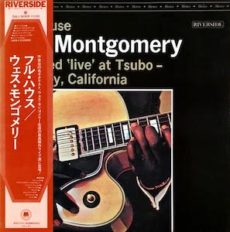
Requisites
Full House ~ Wes Montgomery | By Eddie Carter
In a game of poker, a full house is a five-card hand containing three-of-a-kind and a pair of another. The three-of-a-kind in this morning’s discussion to begin April is a brilliant trio that at the time was Miles Davis’ rhythm section but also a spectacular group in their own right. The pair is a little giant who was diminutive only in height but possessed a robust sound and an extraordinary guitarist who’d taken the jazz world by storm with his playing. Full House (Riverside RLP 434/RS 9434) is a 1962 live date by Wes Montgomery performed with a world-class quartet, Johnny Griffin on tenor sax, Wynton Kelly on piano, Paul Chambers on bass, and Jimmy Cobb on drums. My copy used in this report is the 1974 Victor Musical Industries Japanese Stereo reissue (Riverside SMJ-6069).
The opener, Full House is an original by Wes welcoming everyone inside the club with the quintet’s festive theme. The leader cooks on the first solo with an infectiously happy groove. Johnny comes in next, swinging strongly on the second reading. We’re then treated to a rollicking finale by Wynton punctuated by the rhythm section’s groundwork leading to the climax. I’ve Grown Accustomed To Her Face by Frederick Loewe and Alan Jay Lerner made its debut in the musical, My Fair Lady (1956). This is a trio tune with Wes supported only by Paul and Jimmy. The guitarist approaches the melody and song’s only solo with an intimate beauty and graceful lyricism that’s gorgeously rendered culminating in a tender finale receiving appreciative applause from the crowd.
Blue ‘N’ Boogie by Dizzy Gillespie and Frank Paparelli begins with the ensemble’s vigorous melody. Montgomery begins in good spirits with a lively opening statement, then Kelly shows a masterful hand on the keys. Griffin thrills the listener with utter delight on the next interpretation. Cobb shares an energetic exchange with Wes, Johnny, and Wynton before taking the spotlight himself leading to the ensemble’s reprise and exit. Cariba, the guitarist’s second tune opens Side Two with a positively tropical flavor in the quintet’s theme. Paul lays down some bluesy bass lines on the first solo. Wynton opens the second presentation with exceptionally smooth execution. Griff delivers a good deal of happy excitement in the third reading. Wes adds a pleasant punctuation with a light-hearted, friendly finale.
Come Rain or Come Shine by Harold Arlen and Johnny Mercer premiered in the Broadway musical, St. Louis Woman (1946). Montgomery and the trio pick up the tempo on the introduction and theme. Johnny kicks things off with some exciting blowing. Wes propels the second solo with tasteful playing, and Wynton closes with an eminently enjoyable interpretation before the song’s conclusion. This delightful set concludes with an uptempo cooker by Wes, S.O.S. The ensemble soars collectively in the opening chorus, then Griffin delivers the first solo with a fiery passion. Wes follows with an equally assertive second statement. Wynton adds a bit of effervescent energy to the third reading. Jimmy provides the final fireworks in a conversation with Griff and Wes into the group’s finish.
A few months after the quintet recorded Full House, Tsubo closed, later reopening as The Jabberwock, offering its patrons folk music. It remained open a few more years until the doors closed for good in 1967. This album was produced by Orrin Keepnews and Wally Heider was the recording engineer. Victor Musical Industries has done a fantastic job with the mastering because this reissue sounds incredible with an outstanding soundstage placing the listener in the club with exceptional clarity. If you’re a fan of Wes Montgomery, Johnny Griffin, or Wynton Kelly, I offer for your consideration on your next vinyl expedition, Full House. The music throughout is excellent and there’s superb playing from all hands, making this a perfect title for any jazz library!
~ Come Rain or Come Shine – Source: JazzStandards.com
~ Blue ‘N’ Boogie, I’ve Grown Accustomed To Her Face, The Jabberwock – Source: Wikipedia.org © 2022 by Edward Thomas Carter
More Posts: choice,classic,collectible,collector,guitar,history,instrumental,jazz,music


